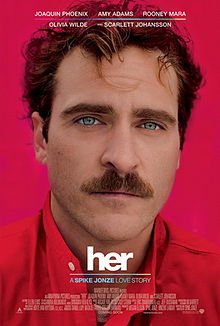
There were two great science-fiction films in 2013. One was Gravity. Her is the other. Of the two, Gravity is immediately spectacular and impressive, wowing audiences with visuals the likes of which we’ve never seen before. But it will be Her that sticks in your mind and that you will talk about with your friends long after the credits have stopped rolling. With some luck, it could also be a film that reshapes how AI is perceived in the public mind for decades to come.
None of the themes presented here are new in written science-fiction and perhaps faint echoes of it can even be seen in earlier films as diverse as Cherry 2000, Blade Runner and Spielberg’s AI. What does set Her apart is that it is not only arguably the first film to depict the technological singularity, it presents that future as a largely utopian vision. The first part of the previous sentence is enough to get sci-fi fans excited since the singularity has been a staple of the genre in written form for the last twenty years at least but until now haven’t showed up on the silver screen.
But it is the second part that really shows off writer and director Spike Jonze’s ambition and creativity because while dystopian portrayals of the future are a dime a dozen, utopian visions are extremely rare, especially if they involve future societies that are radically, as opposed to only cosmetically, different. This is because it is very difficult to create a convincing enough utopia that contemporary audiences can relate to, while still being able to introduce enough conflict to make it an interesting story.
The world in Her is indeed such an utopia even if that isn’t immediately apparent from the perspective of the protagonist Theodore Twombley, he of the amusingly anachronistic name and moustache. I think Jonze playfully tries to mislead audiences at first that his world is dystopian. The early scenes show a city full of people walking alone while talking to themselves, so engrossed in their inner worlds that there isn’t even eye contact with the strangers they pass.
Yet this dreary vision is banished once Theodore and Samantha’s romance hits its peak. The characters may experience angst over whether or not the emotions are real but we in the audience are left with no room for doubt. Jonze pulls out all the stops to convince us that this is as real as any romance can get. Then we realize that what we see as dull from the outside may well hide equally joyful and rich moments in the lives of all those other people. Indeed, the end of the film makes it abundantly clear that the romance is a positive thing in the lives of both Theodore and Samantha and hints towards a transcendent future that is as yet unknowable to us but is indisputably an utopia.
Joaquin Phoenix shines in this very solipsistic role while the never-seen Scarlett Johansson still manages to infuse Samantha with an astonishing amount of character. The cinematography and production values are solid, though I found the emphasis on small quiet moments to be at the same derivative of and less competently done than similar efforts such as Drive. This film feels intensely personal and intimate, leaning perhaps too far on the claustrophobic side, since you can’t help but wonder why else is going on in the wider world.
Like all good science-fiction works, Her presents not just one but many ideas. It challenges our preconceptions and our intellect. But best of all, it successfully shows that all this change can be to the better. That pretty much makes it the ideal science-fiction film.
One thought on “Her (2013)”